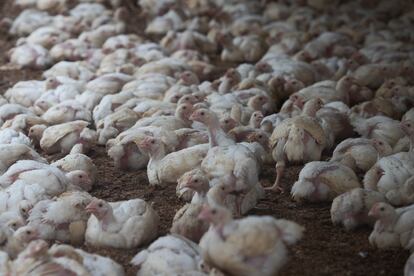Argentina goes on high alert for avian flu
Health authorities have detected at least eight cases of infected birds in the wild and in backyard fowl, and adopted new measures to prevent its spread to poultry farms


Argentina has been in a health emergency for almost a week following the detection of birds infected with avian flu. As of Tuesday, health authorities had detected at least eight cases in the north of the country. Reinforced sanitary controls are being introduced to prevent transmission to commercial poultry farms that produce meat and eggs.
All the infections detected so far were in wild birds or backyard fowl, but the Argentine government is concerned about a possible spread of the disease to commercial farms in an industry that represents more than $350 million in exports a year, according to the Economy Ministry.
“A single case in the production process would automatically lead us to the process of suspending these exports,” said Economy Minister Sergio Massa during the announcement of new measures. The government will reinforce health and sanitary controls at border crossings and will screen natural areas where wild birds congregate.
From Bolivia to Brazil
There is great concern because avian flu is spreading through South America. In Bolivia – which shares a commercially busy border with northern Argentina – the virus was detected in early February and more than 140,000 birds have already been slaughtered on broiler farms. Uruguay has also detected cases, and both Paraguay and Brazil are awaiting confirmations. Transmission of the disease from birds to humans is rare, and it cannot be caught by eating meat or eggs, but the recent behavior of the virus is worrying the scientific community: both Peru and Chile have registered massive deaths of sea lions, presumably from eating infected bird carcasses. But researchers fear that the mass deaths mean the virus may now be capable of spreading between mammals in the wild.
Argentina has not yet confirmed any infections on poultry farms, and the government has asked producers who suspect cases to report them without fear that their production will be affected. “We are going to financially compensate them for the replacement of these birds because we want to transmit peace of mind and also ensure that families who see affected birds with symptoms are not afraid to communicate it,” said Agriculture Minister Juan José Bahillo. So far, health authorities have received 98 notifications of possible infections, including eight detected in the provinces of Córdoba, Santa Fe, Salta and Jujuy.
The country ranks eighth in the world for poultry production, according to the latest annual report from the Ministry of Agriculture. According to government data, 97% of its production is for domestic consumption and the remaining 3% is exported to more than 56 countries. Poultry production is provided by more than 100 small and medium-sized companies, and the industry employs almost 70,000 people nationwide. These producers have been the target of government announcements at a fragile time for all food-producing sectors: the government needs those dollars to curb inflation that is approaching 100% year-on-year and producers are facing the worst droughts in decades.
Sign up for our weekly newsletter to get more English-language news coverage from EL PAÍS USA Edition
Tu suscripción se está usando en otro dispositivo
¿Quieres añadir otro usuario a tu suscripción?
Si continúas leyendo en este dispositivo, no se podrá leer en el otro.
FlechaTu suscripción se está usando en otro dispositivo y solo puedes acceder a EL PAÍS desde un dispositivo a la vez.
Si quieres compartir tu cuenta, cambia tu suscripción a la modalidad Premium, así podrás añadir otro usuario. Cada uno accederá con su propia cuenta de email, lo que os permitirá personalizar vuestra experiencia en EL PAÍS.
¿Tienes una suscripción de empresa? Accede aquí para contratar más cuentas.
En el caso de no saber quién está usando tu cuenta, te recomendamos cambiar tu contraseña aquí.
Si decides continuar compartiendo tu cuenta, este mensaje se mostrará en tu dispositivo y en el de la otra persona que está usando tu cuenta de forma indefinida, afectando a tu experiencia de lectura. Puedes consultar aquí los términos y condiciones de la suscripción digital.








































